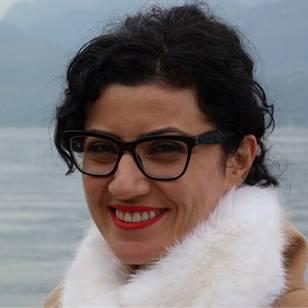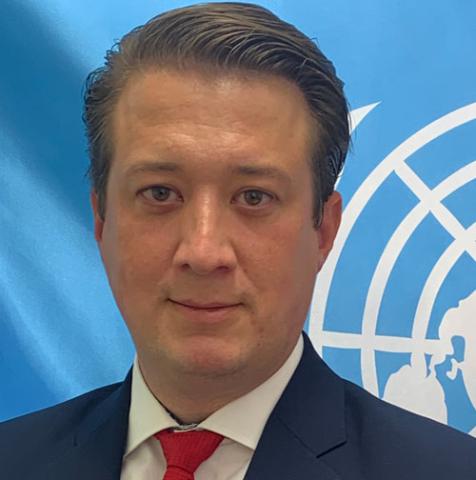A blueprint for self-applied leadership: Spotlight Interview with UNEL-e alum, Erik Andermo
Aida: Erik, tell us a little bit about yourself and your journey at the United Nations (UN).
I am a Development Coordination Officer and Development Economist at the Office of the UN Resident Coordinator in Georgia. I have been working in this role since 2022. I first joined the UN in 2020 as a Special Assistant to the Resident Coordinator. Prior to joining the UN, I was a researcher at the Swedish Institute of International Relations in Stockholm, Sweden.
I am an economist by training and have rather diverse experience with the Government of Sweden, the private sector and other prominent international organizations.
Aida: What prompted you to participate in the UN Emerging Leaders e-Learning programme (UNEL-e)?
I was lucky to get a chance to participate in UNEL-e in 2020 soon after joining the UN. This seemed like a good opportunity to get a crash course in leadership, which I found very useful for my role with the Resident Coordinator’s Office. It is important to have a helicopter view of the system as a whole.
I had also been briefly introduced to the UN System Leadership Framework as part of a pre-deployment training course organized by the Swedish International Development Cooperation Agency (Sida), and UNEL-e caught my attention as a thoughtful and useful blueprint for how to navigate a complex environment.
Aida: How has the UN Emerging Leaders e-Learning experience helped you unleash your leadership potential at the RCO in Georgia?
The deep dive into the UN System Leadership Framework (UNSLF) was particularly useful, and I keep coming back to some of the key concepts from the course in my daily work, which involves coordinating activities across all the member organizations of the UN Country Team (UNCT), as well as many external stakeholders.
The concepts from the UNEL-e, especially the Leadership Framework, empower us as a team in the RCO and UNCT to navigate the often-complex realities of coordination. A simple but useful framework for thinking about the difference between management and leadership comes from the recognition that problems as well as solutions can be either clear or complex. Leadership comes into the picture when both the problem and the solution are complex. Management deals with complex solutions for clearly identified problems. Good leadership means we need to think about not only how to solve a problem, but what the problem is, and why, and if it needs to be addressed given our resource constraints.
Aida: How does the UN System Leadership Framework and the leadership values outlined contribute to your role? How do you employ these values when you face challenges in the field?
In his presentation about the Leadership Framework, Fernando Blasco highlighted:
- that the framework was adopted by the UN Chief Executive Board precisely as a tool for strategic coordination, and
- that the framework complements the reform of the Resident Coordinator system.
Indeed, the UNSLF itself mentions the Resident Coordinator as a multi-dimensional leader across the pillars and functions of the UN. As such, the language in the UNSLF empowers those of us who work on coordination and try to “break down silos”, so to speak, and achieve the transformational change which the 2030 Agenda aspires to achieve.
Aida: Could you tell us the highlights of your learning experience on the UN Emerging Leaders e-Learning Programme?
To me, the session with Fernando Blasco was the most inspiring, as he presented a very thoughtful and holistic view on leadership from a strategic UN perspective based on many years of diverse experience, including in the Executive Office of the UN Secretary-General as well as the business sector. He shared many wise insights. To mention one, I want to single out his perspective on the Renaissance: “One of the most successful revolutions of the world was the Renaissance, when the world moved from an era of oppression to an era of openness, to what we know as the world today, with freedom that is incomparable to the Middle Ages. Who was the leader? There was no leader. There were scholars and people who decided to work and study. It took time, but in the end, it changed the way the world functions. Being pragmatic means transforming yourself to transform others and enable new ways of doing things.”
Aida: You were also a participant of our UN Emerging Leadership and Career Booster for Swedish Junior Professional Officers (JPO) and Special Assistants to the Resident Coordinator (SARCs). How did this programme contribute to the advancement of your career?
The Career Booster programme presented similar ideas to the regular UNEL-e but in a condensed form. It was a very valuable refresher for me. Both of these training opportunities solidified my belief in the UN system, despite all its contradictions and recurring challenges. I remain inspired to continue to pursue a career in the UN. The learning certainly gave me the confidence to apply for my current job, and I am convinced that the insights from this training helped me navigate the recruitment process and prepare for the competency-based interview.
Aida: Would you recommend these training programmes to other emerging leaders, JPOs and SARCs? Why?
I would strongly recommend these training programmes to others, including JPOs and SARCs. They provide a valuable pause for reflection with peers in a systematic and rewarding way. I would recommend participants to take time off work to be able to concentrate fully on the learning experience.
Aida: This year, we are celebrating the 10th anniversary of the UNEL-e programme. What message of inspiration would you leave to all UNEL-e alumni?
Let me share a quote by Alain Sibenaler of United Nations Population Fund (UNFPA) from a session in which he shared his own experience as a leader in the UN: “Emotional intelligence must help you deal with adversity and setbacks. You must be able to navigate absurdities, be they operational, political or otherwise. Do it with your own goal in view. Deal with power. Many people are obsessed with power, but leadership is independent of power. It’s about initiating that which would be impossible to do without you.”
2023 marks the 10th Anniversary of UN Emerging Leaders experience course. To date, more than 1,100 mid-level managers across the UN system have benefited from the programme. Together, they come from more than 135 duty stations and 88 different UN organizations.
If you are keen to step up your leadership in the UN and align your leadership behaviours to the principled and visionary leadership in the UN, we are happy to welcome you to the 2023 Autumn edition of the UN Emerging Leaders e-Learning programme (19 October – 30 November 2023) or to the Spring edition of 2024.
Should you wish to see the testimonials of our alumni please have a look at the trailers. You can read more spotlight interviews, or search for #UNELE2020, #UNELE2021, #UNELE2022, #UNELE2023 #UNELEeca across social media.
You are welcome to have a look at our latest open house webinar recording, presentation and programme e-book. For any inquiries on the upcoming editions and customized programmes for emerging leaders, please email unele@unssc.org.

